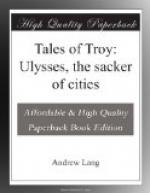Agamemnon was very ready to beg pardon, for he feared that the whole army would be defeated, and cut off from their ships, and killed or kept as slaves. So Ulysses and Aias and the old tutor of Achilles, Phoenix, went to Achilles and argued with him, praying him to accept the rich presents, and help the Greeks. But Achilles answered that he did not believe a word that Agamemnon said; Agamemnon had always hated him, and always would hate him. No; he would not cease to be angry, he would sail away next day with all his men, and he advised the rest to come with him. “Why be so fierce?” said tall Aias, who seldom spoke. “Why make so much trouble about one girl? We offer you seven girls, and plenty of other gifts.”
Then Achilles said that he would not sail away next day, but he would not fight till the Trojans tried to burn his own ships, and there he thought that Hector would find work enough to do. This was the most that Achilles would promise, and all the Greeks were silent when Ulysses delivered his message. But Diomede arose and said that, with or without Achilles, fight they must; and all men, heavy at heart, went to sleep in their huts or in the open air at their doors.
Agamemnon was much too anxious to sleep. He saw the glow of the thousand fires of the Trojans in the dark, and heard their merry flutes, and he groaned and pulled out his long hair by handfuls. When he was tired of crying and groaning and tearing his hair, he thought that he would go for advice to old Nestor. He threw a lion skin, the coverlet of his bed, over his shoulder, took his spear, went out and met Menelaus—for he, too, could not sleep—and Menelaus proposed to send a spy among the Trojans, if any man were brave enough to go, for the Trojan camp was all alight with fires, and the adventure was dangerous. Therefore the two wakened Nestor and the other chiefs, who came just as they were, wrapped in the fur coverlets of their beds, without any armour. First they visited the five hundred young men set to watch the wall, and then they crossed the ditch and sat down outside and considered what might be done. “Will nobody go as a spy among the Trojans?” said Nestor; he meant would none of the young men go. Diomede said that he would take the risk if any other man would share it with him, and, if he might choose a companion, he would take Ulysses.
“Come, then, let us be going,” said Ulysses, “for the night is late, and the dawn is near.” As these two chiefs had no armour on, they borrowed shields and leather caps from the young men of the guard, for leather would not shine as bronze helmets shine in the firelight. The cap lent to Ulysses was strengthened outside with rows of boars’ tusks. Many of these tusks, shaped for this purpose, have been found, with swords and armour, in a tomb in Mycenae, the town of Agamemnon. This cap which was lent to Ulysses had once been stolen by his grandfather, Autolycus, who was a Master Thief, and he gave it as a present to a friend, and so, through several hands, it had come to young Meriones of Crete, one of the five hundred guards, who now lent it to Ulysses. So the two princes set forth in the dark, so dark it was that though they heard a heron cry, they could not see it as it flew away.




